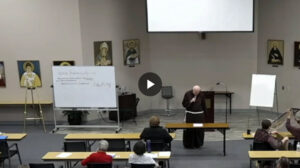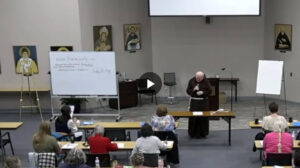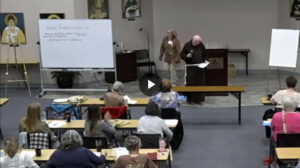LIVING IN “WHAT YOU NEED”
Matthew 19:16-22
Now someone approached him and said, “Teacher, what good must I
do to gain eternal life?”* He answered him, “Why do you ask me about
the good? There is only One who is good. If you wish to enter into life,
keep the commandments.” He asked him, “Which ones?” And Jesus
replied, “‘You shall not kill; you shall not commit adultery; you shall
not steal; you shall not bear false witness; honor your father and your
mother’; and ‘you shall love your neighbor as yourself.’” The young
man said to him, “All of these I have observed. What do I still lack?”
Jesus said to him, “If you wish to be perfect, go, sell what you have
and give to the poor, and you will have treasure in heaven. Then come,
follow me. When the young man heard this statement, he went away
sad, for he had many possessions.
+ Poison, Something To Believe In
“I drive by the homeless sleeping on a cold dark street, like bodies in an open grave,
underneath the broken old neon sign that used to read “Jesus Saves.” A mile away live the rich
folks, and I see how they’re living it up. While the poor, they eat from hand to mouth, the rich is
drinkin’ from a golden cup. And it just makes me wonder: why so many lose, so few win. Give me
something to believe in.”
David Wann and John de Graef, Affluenza
“Possession overload is the kind of problem where you have so many things you find your life is
being taken up by maintaining and caring for things instead of people. Everything I own owns me.
People feel sad and what do they do? They go to the mall, and they shop, and it makes them feel
better, but only for a short time. … Tragedy is wanting something badly, getting it and finding it
empty. Addiction to stuff is not easily understood. The goal is to get back to a place of perceived
power and carefree abandonment.”
Omer Englebert, St. Francis of Assisi
“Of all … virtues, poverty is the one that was to impart its originality to the Franciscan Order and
constitute its ‘true foundation.’
“Voluntarily poor, one may be from philosophy or asceticism, for reasons of zeal, of charity, and
others still. But Francis was poor from love. He made himself poor because his beloved Christ had
been poor. He espoused Poverty because she had been ‘the inseparable companion of the Most
High Son of God,’ and because for twelve centuries she had wandered about forsaken.
“In truth, it was a wonderful union. Never was a loved woman the object of a more chivalrous and
loyal cult, of more impassioned and more charming homage.”
Leonardo Boff, Francis of Assisi
“Francis achieved an incommensurable liberation of the poor. What makes poverty inhuman is
…the scorn, rejection, exclusion from human life together, the permanent brainwashing of a
negative and unqualified image of the poor, developed by non-poor classes. The poor end by
thinking of themselves as …despised. No one is on their side.
“The liberation achieved by Francis consisted in being a rich young man, the flower of the
bourgeois society of Assisi, who took on the condition of the poor and lived like a poor man. He
served the poor, touched them, kissed them, sat at the same table with them, felt their skin, lived in
physical communion with them. These contacts humanize misery; they give back to the poor the
sense of their human dignity, never lost but negated by the society of the healthy….
“Francis has left us with a serious question: is it possible, as he tried to do, for any group to live the
Gospel utopia of radical poverty in a way of achieving a real fraternity?”
Diarmuid O’Murchu, Consecrated Religious Life
“The new vision I refer to has justice-making as a core, central element. Although all the churches
and religious adopt this as a key value, it is given a great deal of rhetoric, but not much practical
expression….[We have] a state of affairs in which the goods of creation are not fairly distributed to
everybody’s advantage. And the motivation behind such work [to correct it] is the conviction,
variously expressed, that God wants everybody treated equally and fairly. … It is at this liminal
juncture that the Religious must stand—unashamed for what he/she espouses, and unrelenting in
the prophetic stance he/she is required to adopt.”
Secular Franciscan Constitutions, (commenting on the Rule, chapter 11) pledging themselves to
“reduce their own personal needs so as to be better able to share spiritual and material goods with
their brothers and sisters, especially those most in need”
Apostolic Exhortation on the Renewal of Religious Life (Evangelica Testificatio)
“In a civilization and a world marked by a prodigious movement of almost indefinite material growth,
what witness would be offered by a religious who let him/herself be carried away by an
uncurbed seeking of his/her own ease, and who considered it normal to allow him/herself
without discernment or restraint everything that is offered him/her? At a time when there is an
increased danger for many of being enticed by the alluring security of possessions, knowledge and
power, the call of God places you at the pinnacle of the Christian conscience.” (19)
If someone would say, “Prove to me that you are poor,” how would you answer?


